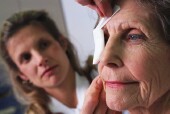Hormone Replacement May Cut Risk for Age-Linked Eye Disease
Estrogen may prevent advanced macular degeneration, study finds.
|
E-mail this article
Subscribe to news
Printer friendly version
|

(SOURCE: JAMA/Archives journals, news release, April 14, 2008)
MONDAY, April 14 (HealthDay News) -- Postmenopausal women who take hormones have a lower risk of developing advanced age-related macular degeneration, especially if they took oral contraceptives in the past, a U.S. study finds.
Age-related macular degeneration (AMD) affects 1.75 million Americans and is a leading cause of vision loss and blindness among older adults, according to background information in the study.
"Although genetics play a key role in susceptibility to AMD, environmental factors, such as smoking, are also important," the researchers wrote. "Evidence of higher rates of AMD in women than in men and links between AMD and cardiovascular disease suggested a role for estrogen" in the development of the condition, they added.
The researchers from Brigham and Women's Hospital and Harvard Medical School in Boston examined data on almost 75,000 postmenopausal women in the Nurses' Health Study. They assessed estrogen-related factors such as postmenopausal hormone use, past use of oral contraceptives, ages at first period and menopause, and childbirth history.
Between 1980 and 2002, 554 of the women developed early AMD, and 334 women developed neovascular (advanced) AMD.
"Currrent postmenopausal hormone users had a notable 48 percent lower risk of neovascular (involving formation of new blood vessels) AMD compared with those who had never used postmenopausal hormones, although risk did not decline linearly with longer durations of use," the study authors wrote. "Risk was lowest for postmenopausal hormone users who had used oral contraceptives in the past."
However, the study found that current hormone users had a 34 percent higher risk of early AMD. There was no link between oral contraceptive use and early AMD. Women who'd given birth were 26 percent less likely to develop early AMD.
"Taken together, these findings suggest a role for estrogen in the pathogenesis of AMD that requires further research in specific early and late signs of disease." the researchers concluded.
The study was published in the April issue of the journal Archives of Ophthalmology.
More information
The U.S. National Eye Institute has more about AMD.
Copyright © 2008 ScoutNews, LLC. All rights reserved. 
HealthDayNews articles are derived from various sources and do not reflect federal policy. healthfinder.gov does not endorse opinions, products, or services that may appear in news stories. For more information on health topics in the news, visit the healthfinder.gov health library.